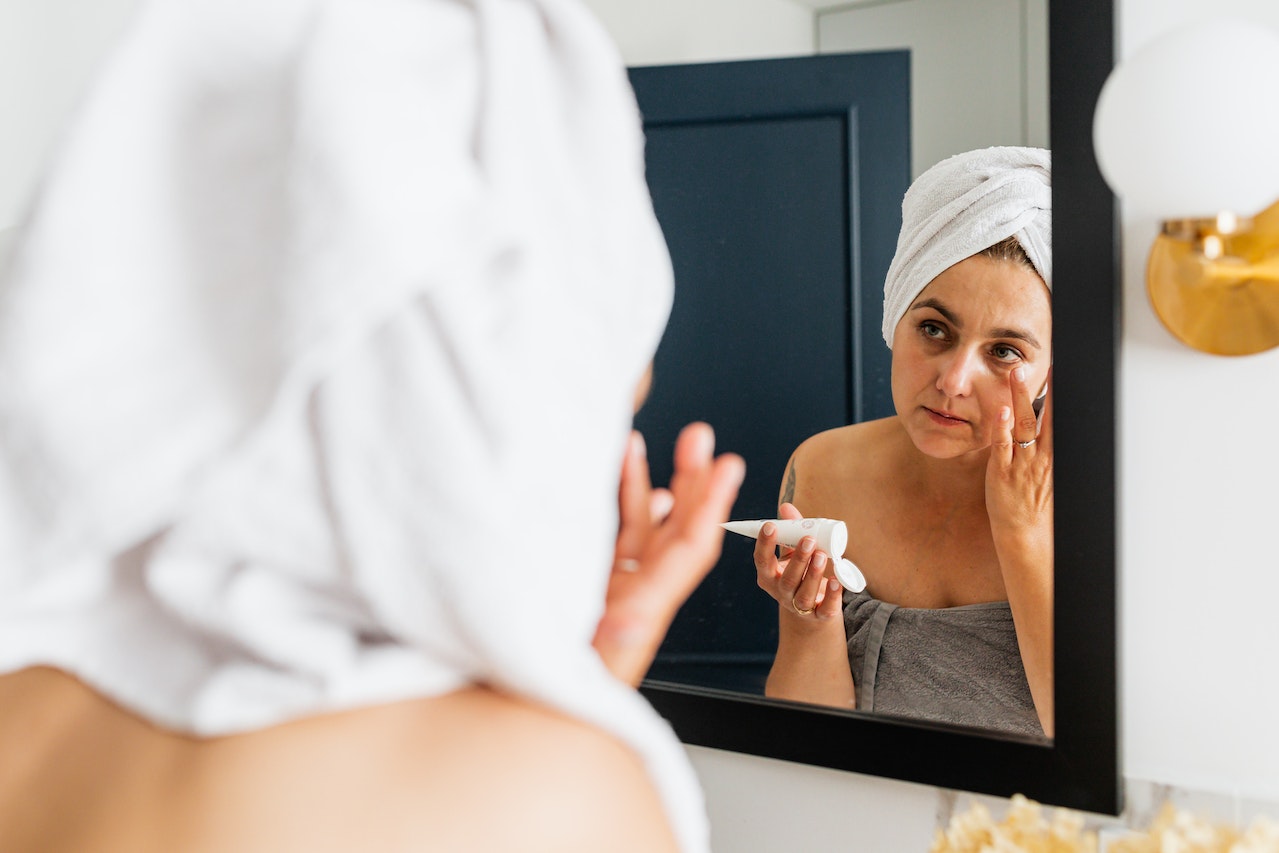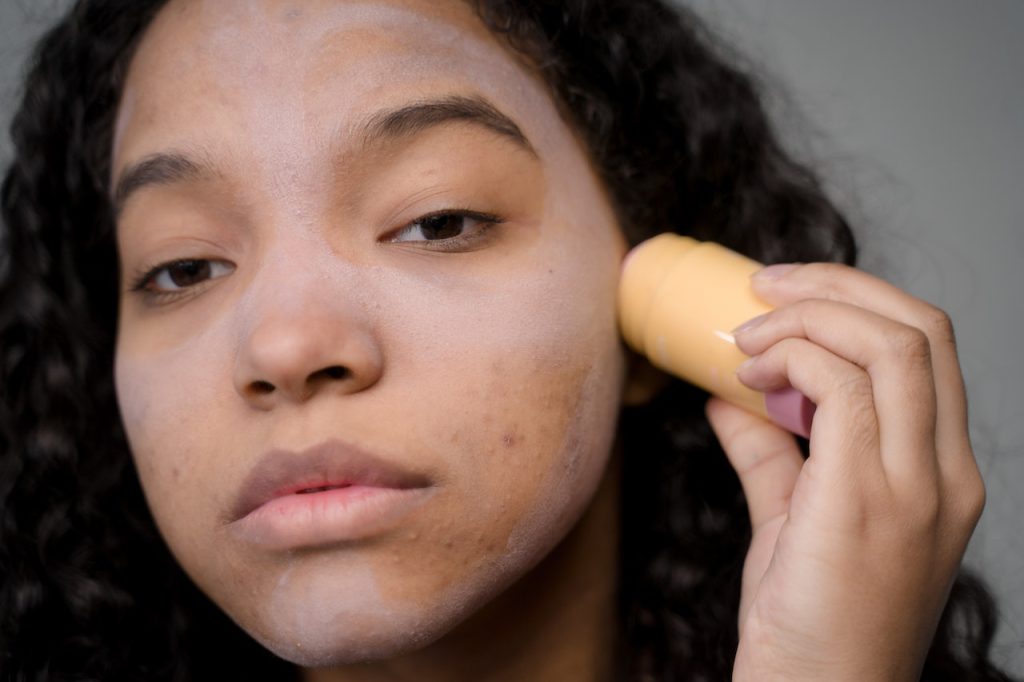- Use an exfoliating body scrub regularly to remove layers of dead skin and generate healthy cells.
- Wash skin with a gentle cleanser and warm water to remove dirt and debris.
- Apply moisturizer to damp skin after bathing to lock in moisture and protect the skin barrier.
- Wear sunscreen when outdoors to protect against UV damage and drying from the sun.
Dry and scaly skin can be an uncomfortable and embarrassing problem. It can cause irritation, itching, redness, and even pain. Fortunately, there are several steps you can take to help keep your skin looking healthy and hydrated. With a little effort, you can have softer, smoother skin free from any signs of dryness or scaling.
Get the right skin products.
Here are some tips on the skin products you’ll need for your dry and scaly skin:
Use an exfoliating salt body scrub.
An exfoliating salt body scrub can be an effective way to deal with dry, scaly skin. This scrub combines coarse- and fine-grain salts with moisturizing oils like sunflower, jojoba, and avocado. When used together, these elements help remove layers of dead and dulling skin on the surface, allowing for the regeneration of healthy cells beneath.
This is vital for keeping skin looking younger and free from irritation caused by dryness. To use this type of scrub properly, apply it to dampened skin using circular motions. Leave the product on briefly before rinsing off completely using warm water. Exfoliating regularly helps remove excess dead cells and provides thorough cleansing to help your skin appear more vibrant and youthful while breathing life back into dry patches on your body.
Use a gentle cleanser and warm water.
Properly washing the skin is essential to maintaining healthy, hydrated skin. A gentle cleanser and warm water should be used when washing to help cleanse your skin and remove dirt or debris. This important step in skincare can help heal dry and scaly skin, as it removes excess oils that may otherwise block pores, preventing the proper absorption of moisture.
Gentle cleansers also contain less harsh ingredients than some soaps, helping to keep the skin from becoming overly dry or irritated from strong detergents. Warm water can also help to boost the effectiveness of a gentle cleanser by helping create a lather that can penetrate more deeply into the pores. In addition to washing your face properly, remember to moisturize afterward to keep your skin healthy and hydrated.
Apply moisturizer regularly

Applying moisturizer regularly throughout the day is an important step in keeping the skin hydrated and healthy. Moisturizer can reduce dryness, protect the skin barrier and help keep harmful bacteria away. It also helps to prevent further dryness caused by washing with soaps, hot water, or other harsh cleansing products.
The best approach to moisturizing is to apply it after a shower or bath when the skin is damp – this will trap moisture and make the skin appear softer and smoother. For best results, choose a moisturizer that suits your skin type (either oil-based for dry skin or water-based for oily skin). Additionally, washing with non-drying soap and lukewarm water instead of hot is recommended for those dealing with dry or scaly skin.
Wear sunscreen
Wearing sunscreen outdoors is a critical way to protect against UV rays that can cause sun damage and drying of the skin. Sunscreen acts as a protective barrier between exposed skin and the sun’s harmful rays. It’s important to apply sunscreen liberally, especially for areas of the body most frequently exposed to the sun, like the face, neck, arms, and legs.
Additionally, it is important to re-apply every two hours after sweating or swimming, as perspiration and water will wash off the protection provided by sunscreen. Once exposed to too much sun, cleaning your skin immediately and using moisturizer to decrease flaking and dryness due to prolonged UV exposure is important.
Take shorter showers with lukewarm water.

Taking shorter showers with lukewarm rather than hot water can effectively deal with dry and scaly skin. Hot water can strip the skin of its natural oils, resulting in dehydration, and leading to uncomfortable flaking and scaling over time.
Lukewarm water helps keep these oils intact and supplies enough moisture to soothe the skin back to a healthy state. Therefore, curtailing shower time and transitioning to lukewarm temperatures is important for maintaining supple, hydrated skin while conserving energy.
Drink plenty of fluids
Providing the body with the necessary hydration is an integral component of healthy skincare, as it helps keep the skin from becoming overly dry and scaly. When the skin does become overly dry, it can lead to roughness, cracking, and even eczema in more extreme cases. To keep the skin moist and nourished, it’s important to drink a sufficient amount of fluids throughout the day or when recommended by a physician. Water is always a good go-to choice but other beverages like milk, coffee, tea, and fruit juices are also beneficial.
All these drinks contain helpful vitamins, minerals, and electrolytes that help hydrate us faster and provide our skin with nourishing nutrients that may help reduce dryness in some cases. Proper hydration is valuable for overall health and keeping our skin looking supple. However, it’s important to note that other factors like genetics, climate, and air quality also play an essential role in maintaining healthy skin.
These are just some of the many tips and tricks you can use to keep your skin healthy and hydrated. With the right products and a regular skincare routine that includes moisturizing, protecting your skin from the sun, and staying hydrated inside and out, you can have smoother, softer skin in no time.
